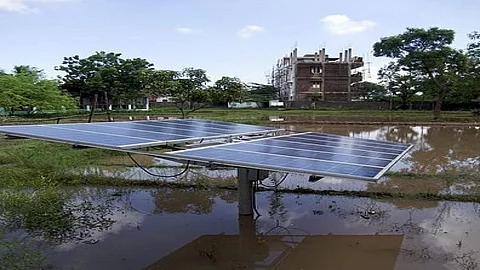
- Topics
- Feature
- Opportunities & Events
- Data
- Hindi Portal
- Topics
- Feature
- Opportunities & Events
- Data
- Hindi Portal

The Ministry of New and Renewable Energy (MNRE) has issued a framework this year for increasing the penetration of Decentralised renewable energy (DRE) across the country and recommended a list of possible DRE products like solar driers, solar cold storage, and solar rice milling for use in textile, agriculture, and other sectors. The framework also talks about integrating several off-grid projects of different ministries to streamline the expansion of the technology.
This is because DRE solutions supporting several traditional rural trades and livelihoods in India have found to have greatly helped reduce trade-related drudgeries and increased income among beneficiaries. Experts argue that large-scale adoption of decentralised renewable technology can help reduce rural-urban migration and create more jobs and livelihood options in rural India (Mongabay, India).
The Maharashtra Government has initiated the process of setting up State Water Informatics Centre (SWIC) on the lines of National Water Informatics Centre (NWIC). According to the order issued by the Water Resources Department (WRD), it will be the nodal department for establishment of SWIC in Maharashtra, and the Chief Engineer (Hydrology and Dam Safety), Nashik will be the Nodal Agency. Water Supply and Sanitation Department, and Soil and Water Conservation Department, will be the supporting departments. All the other line departments and organisations shall collaborate with the SWIC.
The WRD will be responsible for obtaining all necessary approvals for setting of SWIC with regard to its mandate, rules and responsibilities, organisational set up, location, head of organisation, reporting relationship with the lead department and budget provision and sign Memorandum of Agreement (MOA) with NWIC. The State Water Informatics Centre is expected to act as a dedicated organisation for co-ordination, collection, and dissemination of water resources data of Maharashtra with support and guidance from NWIC (The HItavada).
The Forest Advisory Committee (FAC) of the Ministry of Environment, Forests and Climate Change (MoEFCC) has refused Stage II or final forest clearance to the 3,097MW Etalin hydroelectric project in the Dibang river valley in Arunachal Pradesh.
The FAC has also extended the discussion to other upcoming hydel projects in the Dibang Valley.The Etalin project has been controversial because it is planned in an area highly rich in biodiversity. This decision has provided relief to environmentalists and local indigenous populations concerned about India’s hydropower ambitions in the Dibang river valley region of Arunachal Pradesh (Mongabay, India)
Shrinking of land available for grazing due to developmental and wildlife conservation activities, changing weather patterns and increasing hostility toward pastoralists threatens the survival of pastoralists in Rajasthan, home to several pastoral communities such as the Raikas or Rebaris, Raths, Gujjars, and Sindhi Muslims like Amin and Mohammad.
While the pastoralist sector contributes an estimated 3 percent to India's gross domestic product, lack of data and inadequate information on pastoralists leads to ineffective planning and poor framing of developmental policies directed at the pastoralist communities.
Pastoralism is rapidly declining in the state and is particularly noticeable among camel herders, where the young are rapidly moving into new jobs because of the rise in education levels and the depletion in the number of camels in the state. (Scroll)